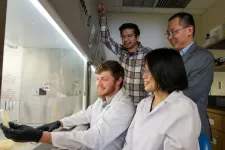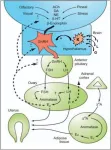(Press-News.org) SEATTLE – Scientists have developed a breakthrough method to track diet using stool metagenomic data.
Developed by researchers at the Institute for Systems Biology (ISB), the new method, called MEDI (Metagenomic Estimation of Dietary Intake), detects food-derived DNA in stool samples to estimate dietary intake. MEDI leverages stool metagenomics, which refers to sequencing all the DNA present in fecal samples (including microbial, human, and food-derived DNA). This non-invasive, data-driven approach offers an objective alternative to traditional food diaries and questionnaires, which are still the gold standard in dietary assessment but can suffer from misreporting and compliance issues.
"For decades, nutrition research has depended on self-reported diaries and questionnaires – approaches that require a high degree of effort and compliance from research participants. How many strawberries did I eat two days ago? Did I have one glass of orange juice with breakfast, or two?" said Dr. Christian Diener, lead author of the study. "MEDI provides a solution by analyzing food-derived DNA in gut metagenomic samples, offering a convenient alternative that shows good agreement with known dietary and nutritional intake patterns."
Key Findings:
An Alternative to Questionnaire-Based Diet Tracking: Leveraging a database of more than 400 food items and over 300 billion base pairs of genomic information, MEDI accurately detected food intake patterns in infants and adults, and across two controlled feeding studies. MEDI
Connecting Dietary Intake to Nutrition: MEDI converts the relative abundance profile of specific food items into nutrient profiles, assuming a 100 gram portion. These nutrient profiles show good agreement with data from controlled feeding studies.
Identified Diet-Related Health Risks: Without food logs, MEDI pinpointed dietary features linked to metabolic syndrome in a large clinical cohort.
"Our study represents a major leap forward in how we track diet and its impacts on human health," said ISB Associate Professor Dr. Sean Gibbons, senior author of the study. "With food-derived DNA signatures in stool, we now have a powerful way to measure diet and microbiome composition from the same sample, which will expand our understanding of the forces shaping the human gut microbiome, personalized nutritional responses, and disease risk."
With further development, MEDI could transform nutrition science, epidemiological studies, and clinical trials, allowing researchers, doctors, and individuals to track diet-related health risks with unprecedented ease.
The full study is published in Nature Metabolism and can be accessed here. For media inquiries or interview requests, please contact ISB’s media team at communications@isbscience.org.
About ISB
Institute for Systems Biology (ISB) is a collaborative and cross-disciplinary non-profit biomedical research organization based in Seattle. We focus on some of the most pressing issues in human health, including aging, brain health, cancer, chronic illness, infectious disease, and more. Our science is translational, and we champion sound scientific research that results in real-world clinical impacts. ISB is an affiliate of Providence, one of the largest not-for-profit healthcare systems in the United States. Follow us online at isbscience.org, and on YouTube, Facebook, LinkedIn, X, Bluesky, and Instagram.
END
Scientists decode diet from stool DNA – no questions asked
Breakthrough method developed at Institute for Systems Biology (ISB) analyzes food-derived DNA in fecal metagenomes, allowing for data-driven diet tracking without the need for burdensome questionnaires
2025-02-18
ELSE PRESS RELEASES FROM THIS DATE:
Biologists transform gut bacteria into tiny protein pharmacies
2025-02-18
Hundreds of different species of microbes live, laugh, and love in your gut. In the future, one of these might serve a new function: microscopic in-house pharmacist.
A new study published Feb. 18 in Nature Biotechnology shows how gut bacteria can be directed to produce and release proteins within the lower gastrointestinal tract — eliminating a major roadblock to delivering drugs to that part of the body.
Oral medication is the most common and practical means of drug administration, but the stomach doesn’t let much pass through unscathed. This is good when it comes to things like foodborne ...
Study sheds light on the genetics of stopping smoking
2025-02-18
The effectiveness of a common drug to quit smoking could be down to people’s genes, according to a study from the University of Leicester (United Kingdom).
Varenicline is widely recognised as the most effective medication for helping people stop smoking, but unfortunately it does not work for everyone.
Researchers from Leicester have uncovered important insights into how people’s DNA affects their response to the drug, which will soon be available to smokers through the UK’s National Health Service (NHS).
Varenicline ...
Landmark review maps complex interactions between sex hormones and neurological health
2025-02-18
MONTREAL, Québec, Canada, 18 February 2025 - A comprehensive review published today in Brain Medicine by leading neuroendocrinologist Professor Hyman M. Schipper from McGill University’s Department of Neurology and Neurosurgery maps out the extensive influence of reproductive hormones on neurological health and disease. This landmark review, appearing in a special Festschrift issue honoring Dr. Seymour Reichlin’s centennial, systematically examines how sex hormones affect a broad ...
Restoring African grassland habitats makes life more peaceful for humans and wildlife, scientists find
2025-02-18
Across Kenya, grasslands underpin people’s lives — as well as those of animals like elephants, giraffes, and hyenas. But the climate crisis is drying out these habitats, forcing people and animals to compete for resources, and increasing both community tensions and conflict between humans and wildlife. Researchers monitoring both grassland restoration and conflicts have now found that restoration can help reduce human-wildlife conflict and improve community relations: the more local grassland is restored, the less conflict there is.
“Grassland restoration is playing a role in reducing human-wildlife conflicts, social conflicts and the overall feeling of insecurity ...
Ventilation fans can significantly lower the risk of inhaling bacteria particles after toilet flushing
2025-02-18
Bioaerosol emissions during toilet flushing are an often-overlooked source of potential health risks in shared public facilities. A new study published in Risk Analysis found that bioaerosol concentrations of two bacteria -- Escherichia coli (E. coli) and Staphylococcus aureus (S. aureus) -- exceeded acceptable levels established by the Centers for Disease Control (CDC) after toilet flushing. Inhaling these biological particles can produce symptoms like abdominal cramps, nausea, diarrhea, and vomiting.
The research was conducted in two restrooms located in an office building in China. One contained a squat toilet and the other a bidet toilet. Scientists measured the emissions ...
Legionnaires’ disease from a lake swim
2025-02-18
Swimming in some lakes with still water can lead to infection with Legionella, bacteria that can cause pneumonia, and people who engage in open water swimming should be aware of this risk, say the authors of a practice article published in CMAJ (Canadian Medical Association Journal) https://www.cmaj.ca/lookup/doi/10.1503/cmaj.241086.
“Legionella infection represents a public health hazard owing to its ability to spread through exposure to natural water bodies and human-made water reservoirs,” writes Dr. Ashley Bryson, an internal medicine resident at the University of Manitoba, with coauthors.
Legionella infection is an atypical cause of community-acquired ...
New remotely-delivered support programme could deliver excellent care while saving the NHS and social care an average of £9000 a year for each person with dementia
2025-02-18
UNDER STRICT EMBARGO UNTIL UNDER STRICT EMBARGO UNTIL MONDAY 17 FEBRUARY 2025 AT 23.30 (UK TIME).
Peer reviewed | Randomised Controlled Trial | People
The NIDUS-Family package of care uses goal setting to help people with dementia live well at home for longer. New research from Queen Mary University of London in collaboration with UCL shows that, in addition to these known benefits, NIDUS-Family also reduces the costs associated with providing support to people with dementia.
Approximately ...
Global action needed to solve the medical oxygen crisis
2025-02-18
Targets for universal access, national roadmaps and more affordable and accessible care are vital to help fill the medical oxygen gap affecting more than half of the world’s population, according to a new global report.
The Lancet Global Health Commission report details for the first time how future investment in strengthening medical oxygen systems could have a huge impact by saving millions of lives and improving pandemic preparedness.
Almost 400 million children and adults require medical oxygen every year. More than five billion people, 60 per cent of the world’s population, don’t have access to safe and ...
Study findings raise questions about the inclusion of sepsis bundle in the CMS value program
2025-02-17
Embargoed for release until 5:00 p.m. ET on Monday 17 February 2025
@Annalsofim
Below please find summaries of new articles that will be published in the next issue of Annals of Internal Medicine. The summaries are not intended to substitute for the full articles as a source of information. This information is under strict embargo and by taking it into possession, media representatives are committing to the terms of the embargo not only on their own behalf, but also on behalf of the organization they represent.
----------------------------
1. ...
Singapore launches Mental Health Innovation Asia Hub at international symposium
2025-02-17
High demand: Mental health now tops health concerns in Singapore, surpassing cancer and COVID-19.
New regional hub: MHIN Asia Hub, based in Singapore, aims to share innovative resources and ideas to promote mental health support across Asia.
SINGAPORE, 17 February 2025 – In a significant advancement for mental health care, the SingHealth Duke-NUS Global Health Institute, in collaboration with the Mental Health Innovation Network (MHIN), unveiled today the MHIN Asia Hub. This milestone event, a cornerstone of the inaugural Global Mental Health in Asia Symposium, marks a major step in addressing ...
LAST 30 PRESS RELEASES:
Sleep loss linked to higher atrial fibrillation risk in working-age adults
Visible light-driven deracemization of α-aryl ketones synergistically catalyzed by thiophenols and chiral phosphoric acid
Most AI bots lack basic safety disclosures, study finds
How competitive gaming on discord fosters social connections
CU Anschutz School of Medicine receives best ranking in NIH funding in 20 years
Mayo Clinic opens patient information office in Cayman Islands
Phonon lasers unlock ultrabroadband acoustic frequency combs
Babies with an increased likelihood of autism may struggle to settle into deep, restorative sleep, according to a new study from the University of East Anglia.
National Reactor Innovation Center opens Molten Salt Thermophysical Examination Capability at INL
International Progressive MS Alliance awards €6.9 million to three studies researching therapies to address common symptoms of progressive MS
Can your soil’s color predict its health?
Biochar nanomaterials could transform medicine, energy, and climate solutions
Turning waste into power: scientists convert discarded phone batteries and industrial lignin into high-performance sodium battery materials
PhD student maps mysterious upper atmosphere of Uranus for the first time
Idaho National Laboratory to accelerate nuclear energy deployment with NVIDIA AI through the Genesis Mission
Blood test could help guide treatment decisions in germ cell tumors
New ‘scimitar-crested’ Spinosaurus species discovered in the central Sahara
“Cyborg” pancreatic organoids can monitor the maturation of islet cells
Technique to extract concepts from AI models can help steer and monitor model outputs
Study clarifies the cancer genome in domestic cats
Crested Spinosaurus fossil was aquatic, but lived 1,000 kilometers from the Tethys Sea
MULTI-evolve: Rapid evolution of complex multi-mutant proteins
A new method to steer AI output uncovers vulnerabilities and potential improvements
Why some objects in space look like snowmen
Flickering glacial climate may have shaped early human evolution
First AHA/ACC acute pulmonary embolism guideline: prompt diagnosis and treatment are key
Could “cyborg” transplants replace pancreatic tissue damaged by diabetes?
Hearing a molecule’s solo performance
Justice after trauma? Race, red tape keep sexual assault victims from compensation
Columbia researchers awarded ARPA-H funding to speed diagnosis of lymphatic disorders
[Press-News.org] Scientists decode diet from stool DNA – no questions askedBreakthrough method developed at Institute for Systems Biology (ISB) analyzes food-derived DNA in fecal metagenomes, allowing for data-driven diet tracking without the need for burdensome questionnaires

